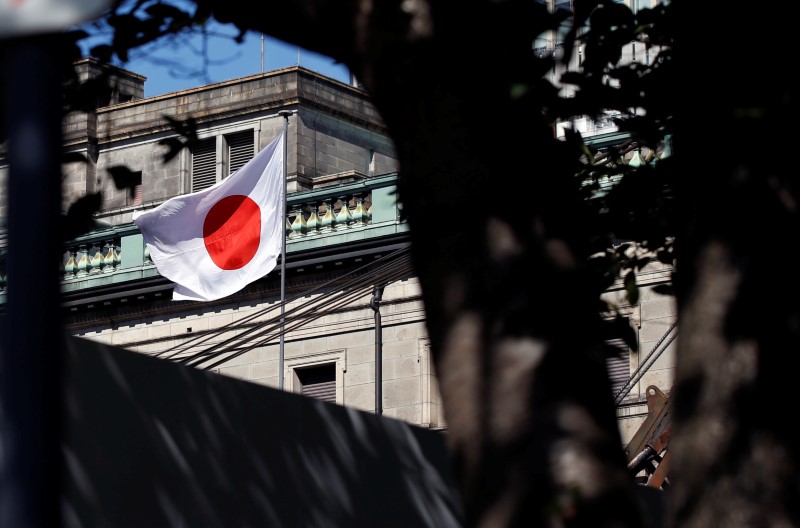 © Reuters. A Japanese flag flutters atop the Bank of Japan building under construction in Tokyo
© Reuters. A Japanese flag flutters atop the Bank of Japan building under construction in TokyoBy Leika Kihara
TOKYO (Reuters) – Japan’s central bank is not expected to change settings at its policy review this week, but the debut of a dovish new deputy could widen a rift between advocates of continued stimulus and those wary of the rising costs of prolonged easing.
Few analysts expect the Bank of Japan’s new deputy governor, Masazumi Wakatabe, to rock the boat by proposing ramping up stimulus at the two-day rate review that ends on Friday.
But his presence would add clout to a group of board members who believe the BOJ should do more to accelerate inflation, or at the very least maintain stimulus for as long as possible.
That could widen a split with others in the board who see little room to ramp up stimulus, and fret about the rising cost of easing such as the hit to bank profits from near-zero rates.
“Wakatabe will probably stay quiet for a while. But he could push for additional easing if the economy worsens,” said Mari Iwashita, chief market economist at Daiwa Securities.
“That would spell trouble for the BOJ because it has virtually no tools left to expand stimulus.”
At this week’s rate review, the BOJ will likely maintain its view that inflation will reach its 2 percent target next fiscal year and project it will stay near that level the following year, sources have told Reuters.
Such a forecast would support BOJ arguments against expanding stimulus. Governor Haruhiko Kuroda is also set to reassure markets it is nowhere near an exit from ultra-loose policy given risks to the inflation outlook.
While no policy shift is expected in the near-term, the gap in views among the board members could complicate Kuroda’s efforts to communicate the bank’s policy intentions. Mixed messages from central bankers have already rattled markets in recent months.
As an academic at Waseda University in Tokyo, Wakatabe had proposed ramping up the BOJ’s bond buying and taking bolder steps to achieve its price goal.
The view meshes with that of board member Goushi Kataoka, an economist, who sees the BOJ’s current price forecast as too optimistic and wants it to do more to push down longer-term bond yields.
On the other side of the debate are people like former commercial banker Hitoshi Suzuki, who said in February the BOJ could raise rates or slow risky asset buying if the costs of easing outweigh the merits.
Kuroda and his bureaucrats are also more open to discussing the cost of their policy. In a report assessing the banking sector issued last week, the BOJ warned that narrowing margins are forcing banks to take on more risk by boosting lending to companies with low-profit businesses.
“The report is signalling the possibility that excessive risk taking and distortions are increasing,” said Ryutaro Kono, chief Japan economist at BNP Paribas (PA:). “The BOJ may be preparing an argument to justify a future policy normalisation.”
Many analysts say Wakatabe won’t turn against Kuroda easily since he is mandated to assist the governor as one his deputies.
Still, it is uncertain whether Wakatabe would keep his views to himself if the BOJ were to start signalling an end to easy policy, some say.
“Wakatabe is known as a hard-core reflationist and so could persist to his views even as deputy governor,” said Koichi Fujishiro, an economist at Dai-ichi Life Research Institute.
“While additional monetary easing may be some time away, his presence alone could dampen prospects of an early exit.”
Source: Investing.com





























